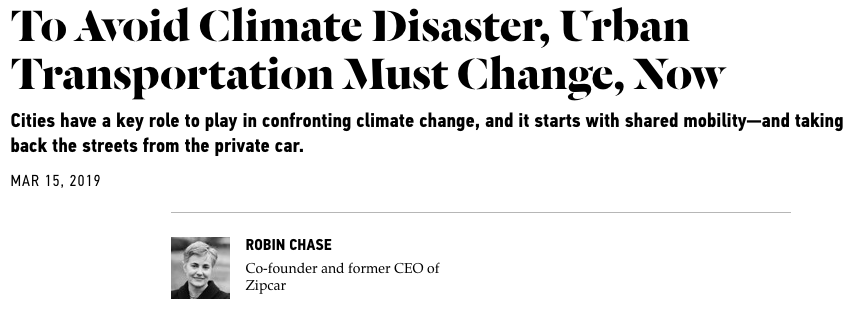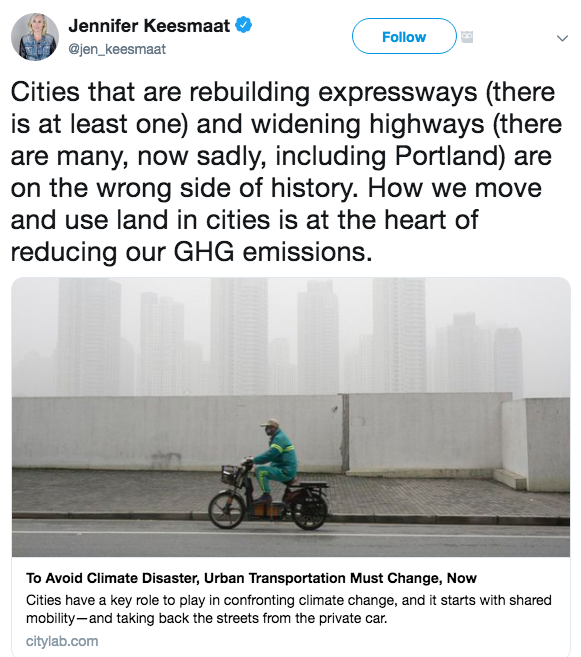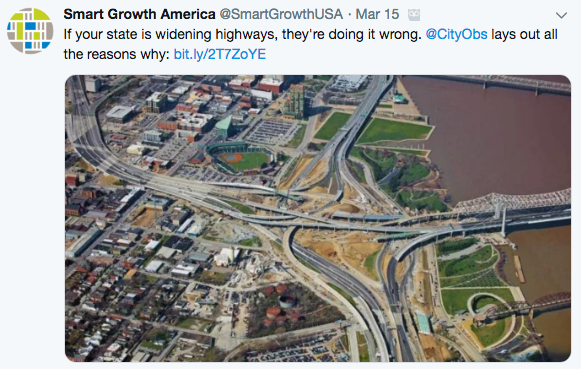Long regarded as a national leader in transportation policy, Portland is being called out by some of the best and brightest for a wrong-headed decision to spend half a billion dollars widening freeways. The damage done is not just to the city’s reputation.
Janette Sadik-Khan: Once king of sustainable transpo, Portland could be come jester
Robin Chase: Portland’s planned investment in highway widening is pointless, counterproductive, and a misuse of funds
Jennifer Keesmaat: Cities that are widening highways, including, sadly, Portland, are on the wrong side of history
Jeff Speck: This is a clear case of State DOTs vs. cites, and humans. If Portland loses, can any of us have hope?
It’s remarkable. In just the past couple of weeks, many of the nation’s most widely recognized and authoritative leaders on transportation policy have taken note of plans unfolding in Portland to spend $500 million to widen a mile-long stretch of the Interstate 5 freeway opposite downtown Portland. From these leaders, there’s a sense of shocked disbelief and dismay, that in the face of an increasingly dire climate crisis, Portland is squandering money of freeway widening.
Here’s Janette Sadik-Khan–pioneering transportation director under New York Mayor Michael Bloomberg, and founder of the National Association of City Transportation Officials, and author of StreetFight–had a visceral reaction when she read about Portland’s Rose Quarter freeway widening project.
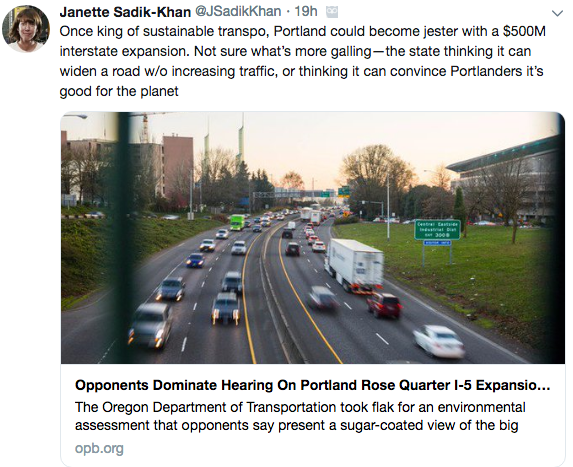 At the same time, Robin Chase a pioneer entrepreneur in innovative transportation and founder of ride-sharing firm ZipCar, wrote at CityLab about the critical role cities have to play in fighting climate change, in an article bluntly titled: “To avoid climate disaster, urban transportation must change.”
At the same time, Robin Chase a pioneer entrepreneur in innovative transportation and founder of ride-sharing firm ZipCar, wrote at CityLab about the critical role cities have to play in fighting climate change, in an article bluntly titled: “To avoid climate disaster, urban transportation must change.”
She singled out the need to stop building additional road capacity:
How cities spend their money
Right now, too many transportation investments take us further away from a carbon neutral world, rather than closer. We need to stop investing in new automobile infrastructure and put that money into improving the quality and service of more efficient ways of travel, such as public transit and segregated bike lanes. Not only have these been typically underinvested in, the investments that have been made are not commensurate with the fraction of travel that should be made by these means.
Chase followed up with City Observatory by email to lend her thoughts on the Rose Quarter project.
Portland’s planned investment in highway widening is pointless, counterproductive, and a misuse of funds. We’ve learned and proven again and again that highway widening induces demand and is therefore provides just short-term relief. Just at the moment when we need to reduce carbon emissions and especially in the challenging transport sector, this investment would increase vehicle miles travelled and emissions. That said, the timing of this scale of investment in transport infrastructure could not be better if it were strategically invested in ways to reduce car dependency, reduce fuel use, and improve the quality and reach of more efficient modes.
Portland’s freeway fight has even drawn international attention. Chase’s article drew a comment from Jennifer Keesmaat, former planning Director for Toronto (and a recent mayoral candidate there as well) who likewise expressed her disappointment at Portland’s lack of leadership:
Jeff Speck, the author of Walkable City and Walkable City Rules, wrote to us via email to say:
The data are clear: if Portland wants to worsen its air quality, crash mortality rate, traffic congestion, carbon footprint, and inner-city property values, it should plow right ahead with the I-5 expansion. Once again, this is a clear case of State DOTs vs. cites, and humans. If Portland loses, can any of us have hope?
This set of concerns also extends to the proposal that Portland’s regional government will likely designate half of the money raised from a likely regional bond measure to expanding roads. Yonah Freemark, author of the blog Transport Politic, tweeted:
It’s really this simple: If you think climate change is a pressing concern, stop funding expanded roadways. The idea the Portland could designate half its future transport dollars to roads is scary and indicative of a lack of political leadership.
Here’s Vox’s David Roberts, responding to an Op-Ed authored by the Chair of the Oregon Transportation Commission:
https://twitter.com/drvox/status/1117875312623116288
Streetsblog USA, the nation’s leading transportation reform website lamented:
Brent Toderian, former planning director for Calgary and Vancouver, added his voice.
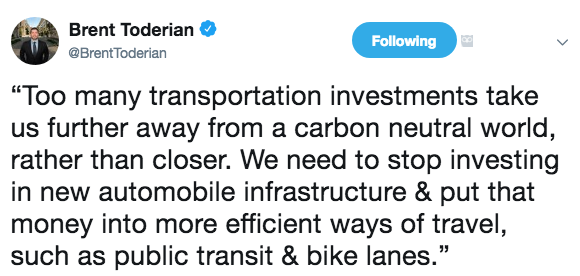
Although they didn’t mention Portland by name, Smart Growth America specifically warned cities about the danger of having their transportation and urban planning decisions made for them by state DOTs. In an article titled “How to build a better state DOTs,” Smart Growth America argued:
Big, over-engineered road projects waste precious funds, generate more driving and more pollution, and prioritize high-speed vehicle travel over the safety of every other road user.
Similarly, Lara Fishburne, Joseph Kane and Adie Tomer, transportation experts at the Brookings Institution, writing on March 20, 2019, argued that if we’re to make progress, city leaders have to overcome a fixation with traffic. Their article, “Stop trying to solve traffic and start building great places,” is directly applicable to Portland’s situation, where the Rose Quarter project is aimed at trying to improve the “level of service” (LOS) a letter grade measuring how fast cars move at the peak hour. They explain that the obsession with chasing level of service has made urban transportation problems worse:
The irony of the LOS system is that it hasn’t solved congestion at all. In fact, it’s just the opposite: LOS keeps making traffic worse.
The fundamental reason is that state and local governments often only view new or wider roads as the right intervention to improve LOS. Major urban road mileage rose by 77 percent from 1980 to 2014 (a total of 169,153 lane miles), compared to 41 percent growth in U.S. population. As the number of lane miles grew, urban residents drove more, and vehicle miles traveled (VMT) on major urban roads grew by 146 percent over the same period. This phenomenon is best explained by the concept of “induced traffic,” which states that more roadways just means more miles traveled via car.
Not only does all that LOS-inspired construction fail to solve congestion, it actually helps create other sets of challenges. Urban highways cut through and separate communities, incentivize sprawling development, and over decades have contributed to the hollowing out of urban neighborhoods. Wide roads encourage high speeds, making corridors unsafe, and simply unpleasant, for pedestrians and bike riders while reducing overall quality of place. Finally, because only a few hours of peak use determine LOS, state and local governments build roads that are underutilized most hours of the day, and cost more to maintain in the long run.
A city’s soul, not just its reputation, is at stake
For decades, Portland has traded on its reputation as a leader in progressive transportation policies. In the 1970s, the city tore out a waterfront highway to build an urban park and cancelled another proposed freeway and used the money it saved to build the first leg of its light rail transit system. Killing the Mount Hood Freeway was the seminal event in the creation of the modern, progressive Portland. As the city’s original alt-weekly, Willamette Week, chronicled:
The Portland City Council voted in July [1973] to kill the freeway. The victory did more than stop one road from tearing up quiet residential streets. Light rail became the region’s primary answer for transportation. Neighborhood associations emerged as the power blocs of Portland politics. Most of all, the victory over the Mount Hood Freeway created the story of Portland exceptionalism, and the fight helped define us as an urban model for the nation. The heady days following the freeway’s death gave many at City Hall the conviction there was more that could be done, that a progressive movement was about to overtake a stodgy Portland.
It’s been a leader in urbanism and bike transportation. But arguably, the city may be coasting, drawing on the fading glamor of past successes, and with little appetite or courage for aggressive leadership in what is decidedly a more serious situation.
As Brent Toderian has wisely observed,“The truth about a city’s aspirations isn’t found in its vision, it’s in its budget.“ The $500 million I-5 Rose Quarter Freeway widening project is the largest single transportation investment currently on offer for the Portland’s central city. Spending that much to make car movement easier makes a mockery of stated city and state goals to reduce carbon emissions–even as the state’s Global Warming Commission points out that the state is losing ground in its adopted goal to reduce carbon emissions to 20 percent of 1990 levels by 2040, solely due to the recent increase in driving.
Ultimately, this isn’t about losing credibility with transportation thought leaders and think tanks–though we should ponder their warnings carefully. It’s really about who we are as a city. In the face of the most serious environmental crisis we’ve ever experienced, we can’t align our spending choices with our stated values, maybe we’re not the place we thought we were, or the place we say we want to be.
_____
Editors Note: This commentary has been revised to include comments from Yonah Freemark, David Roberts and Jeff Speck.

